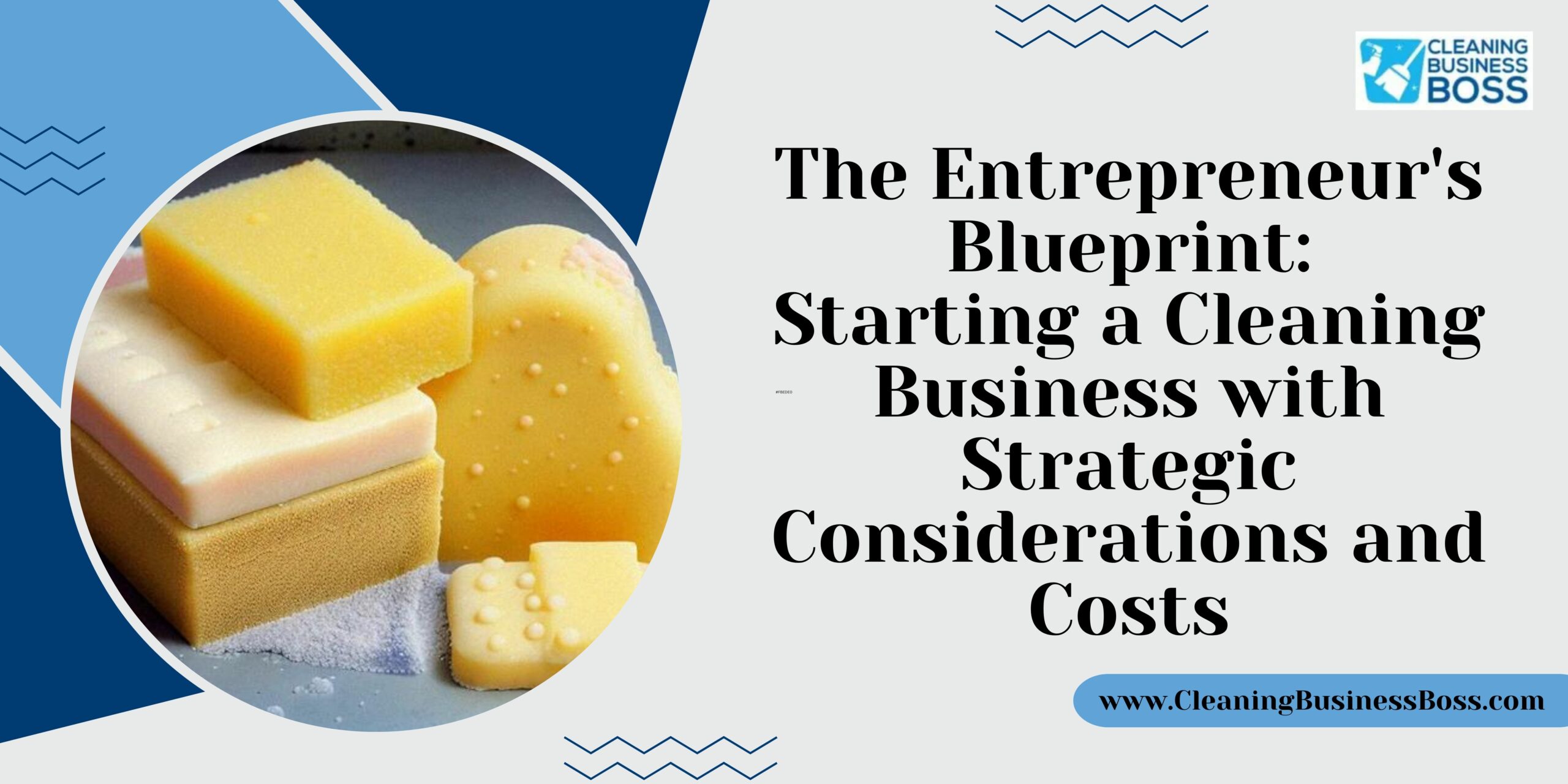Beginning your own cleaning business has the potential to be a highly fruitful endeavor with enormous room for expansion and achievement. Having said that, to set out on this adventure, it is necessary to approach it with thorough planning and consideration.
The best way to start a cleaning business is for you to consider factors like location, size, and services offered, as the start-up cost typically ranges from $500 to $5,000 for necessary supplies, equipment, licenses, insurance, and marketing.
This article will discuss the optimal method to launch a cleaning business, including the factors to consider and the estimated start-up costs.
Location: Choosing the Right Market
The location you select when starting a cleaning service is crucial to determining its growth. Understanding the demand for cleaning services in the area requires a thorough analysis of the local market. Take into account elements like the amount of rivalry, the number of business establishments, and population density.
It is essential to focus on locations with a higher concentration of potential customers to increase your chances of growth. Office buildings, malls, and residential areas are frequently thriving marketplaces for cleaning services. These places frequently require cleaning and upkeep, which offers a multitude of options for your company.
Perform a thorough market analysis to find regions with unrealized potential. Look for areas or neighborhoods where there is a large demand for cleaning services but little to no competition. As a result, you may get a competitive edge and improve your ability to attract clients.
It is essential to comprehend the characteristics and interests of your target market. Are you trying to attract busy business people who require routine office cleaning services? Or possibly weekly or monthly domestic cleaning needs for families? You may promote your company as a solution that stands out from the competition by customizing your services to match the unique needs of your target audience.
Creating a marketing plan is equally crucial when taking location-based factors into account. To efficiently reach your target market, use a variety of methods. This could involve social media marketing initiatives, online advertising, and more conventional marketing techniques like handing out leaflets or networking in your neighborhood. Your ability to create persuasive marketing messages that appeal to potential customers depends on your ability to comprehend the preferences and behaviors of your target market.
Networking with other companies in your target area might lead to partnerships and referrals. Make contacts with nearby businesses that might need cleaning services, such as real estate agents, property managers, or landlords. These partnerships can increase your clientele and generate a consistent flow of work.
Size: Determining Your Business Scope

The size of your operation is an important factor to take into account when starting a cleaning business because it will affect your capacity to manage a variety of projects and clients. The right size will rely on several things, such as the resources you have access to, your financial situation, and your tastes.
One choice is to start as a solo operator and take care of every cleaning duty yourself. Since you won’t initially need to hire staff, this strategy offers flexibility and cheap overhead costs. For small-scale residential cleaning projects or serving a specialized market with particular cleaning requirements, going solo at first is ideal.
As an alternative, you can decide to launch a bigger cleaning company that can manage bigger contracts and clientele. This would entail assembling and overseeing a workforce. With a crew in place, you can broaden the scope of the services you offer and take on bigger home or commercial projects, office cleaning, or commercial contracts. By expanding your company, you may be able to bring in more money and attract more clients.
It’s crucial to take your long-term objectives and expansion plans into account when choosing the size of your cleaning company. Starting small and gradually adding staff and resources as your clientele and demand for your services grow could be advantageous if you want to scale up and expand your business. This strategy enables you to reduce risks and ensure better resource management, including both financial and human capital.
Starting small provides you the chance to optimize your cleaning procedures, create effective workflows, and establish a strong reputation for dependability and quality. You can progressively grow your operations and take on bigger tasks as you gain experience and amass a loyal clientele.
Take into account your tastes as well as the level of involvement you would like in the daily operations of your company. Some business owners love being hands-on, doing the cleaning themselves, and keeping in close contact with their clientele. Others might prefer to concentrate on managerial duties, such as leading a team and managing business affairs.
Services Offered: Specialization and Niche Markets
It’s crucial to decide on the cleaning services you’ll provide before starting a cleaning firm. Although offering broad cleaning services is a popular option, specializing in a certain industry can provide you with a competitive advantage and draw customers looking for particular services. By concentrating on a specific niche market, you can establish yourself as an authority in that field and customize your solutions to satisfy the particular requirements of your target clients.
One choice is to concentrate on cleaning commercial offices. To maintain a tidy and professional work environment, many organizations need to perform regular cleaning and maintenance. You can target a gainful market segment by providing specialist services like janitorial services, floor care, or window cleaning exclusively for office premises.
Post-construction cleaning is another market to take into account. Dust, trash, and other messes are frequently left behind by construction projects and need to be cleaned up carefully. You may serve contractors, builders, and property owners that require their properties cleaned following building or restoration projects by offering specialist post-construction cleaning services.
A second specialized market with strong demand is carpet and upholstery cleaning. For their carpets, rugs, and upholstered furniture, both residential and commercial clients frequently hire cleaning professionals to renew and preserve their surfaces’ cleanliness. By focusing on this field, you may provide stain removal and deep cleaning services that go beyond simple vacuuming, drawing clients who value the knowledge and tools needed for such jobs.
Analyze the demand in your target market to choose the ideal niche for your cleaning company. To learn about the interests and wants of potential customers, conduct market research. Look for any sectors of the cleaning business that are neglected or have gaps, and then examine how your specialized services may cover those gaps. To make sure there is enough demand to support your firm, you should also assess the level of competition in your selected area.
Adapt your marketing strategies to draw attention to your specific offerings. Create a persuasive value proposition that highlights the advantages of selecting a provider of specialist cleaning services. Create marketing materials with a specific audience in mind, such as brochures or websites that highlight your subject-matter knowledge.
Remember that just because you specialize does not preclude you from providing basic cleaning services as well. You can emphasize your expertise in a certain sector while still offering a variety of cleaning services. Combining general and specialist cleaning services can increase flexibility and serve a wider range of customers.
Start-Up Costs: Estimating Necessary Expenses

For budgeting and financial planning, it is essential to understand the start-up costs involved. Depending on the size and extent of your business, the first expenditure may vary, but the normal range for the costs of the necessary materials, tools, permits, insurance, and marketing is between $500 and $5,000. The following list breaks down the necessary start-up costs:
Supplies and Equipment
To ensure the effectiveness and efficiency of your services, invest in high-quality cleaning materials and equipment. Brooms, mops, vacuum cleaners, window-cleaning tools, cleaning chemicals, and safety gear are included. Calculate the prices based on the size of your business and the services you intend to provide.
Licenses and Permits
Verify local laws to find out which licenses and permits are necessary in your area to run a cleaning business. A business license, trade-specific licenses, and insurance coverage might be examples of this. Do your homework on the fees involved and follow all legal regulations.
Insurance
Get the right insurance coverage to safeguard your customers and your company. To protect against potential harm or injuries during cleaning activities, general liability insurance is crucial. The price of insurance will vary depending on several variables, including your location, the size of your company, and the services you provide.
Marketing
Set aside some of your startup budget for promotional activities. In today’s digital world, creating a strong online presence through a website and social media profiles is crucial. Take into account conventional advertising strategies like producing fliers or business cards. Decide which marketing tactics would best reach your target market, and then allocate your budget accordingly.
Operational Expenses
Take into consideration continuing operational costs like those for electricity, travel, and office supplies. These expenses will change depending on the size and type of your company. To ensure long-term viability, a thorough grasp of these costs is essential.
Explore the power of commercial cleaning calculator by visiting this article here.
Business Plan: Roadmap to Accomplishment

Before starting your cleaning business, it is essential to create a thorough business plan. A business plan acts as a road map, directing your activities and choices and giving your venture a defined direction. You can stay organized and committed to your goals by using this to establish your goals, tactics, and financial projections. A strong business strategy can also help obtain funding or lure potential investors.
Start by performing a comprehensive market analysis. Study the cleaning market in your intended audience, taking into account elements like trends, competition, and client demographics. Determine your company’s unique selling propositions and how you will set yourself apart from rivals. You can use this data to identify the market for cleaning services and target particular consumer groups.
Next, evaluate the market environment. Determine your main rivals, then evaluate their advantages, disadvantages, and pricing tactics. Recognize what makes you unique from the competition and emphasize this in your business plan. Take into account the standard of your services, customer support, technology integration, and any particular knowledge you provide.
Another key area to cover in your company plan is pricing methods. Consider elements including the cost of goods, equipment, labor, and administrative charges when you decide how to set your prices. To make sure your charges are both reasonable and gainful, research industry standards and competitive pricing.
Your marketing strategies should spell out how you’ll draw in and keep customers. Determine your target markets, create your marketing plans, and specify your distinctive value proposition. Choose the best methods for reaching your target demographic, such as social media marketing, local networking, or internet advertising. To measure the growth of your marketing initiatives, set quantifiable targets and include a budget for marketing expenses.
To prove the feasibility and profitability of your cleaning business, financial projections are necessary. Create thorough financial projections, including balance sheets, income statements, and cash flow statements. Calculate your startup costs, ongoing costs, projected sales, and break-even analysis. Setting realistic goals and evaluating your company’s financial viability will be much easier with this.
Frequently Asked Questions
What licenses and permits are necessary to launch a cleaning business?
You must conduct research and acquire all relevant licenses and permits in your particular location before starting a cleaning business. Depending on the nation, state, or city in which you intend to conduct business, these criteria may change. To legally operate your cleaning service, you will typically need to obtain a business license. You might also need licenses or permits that are particular to your trade, like one for cleaning or janitorial services. For information on the particular licenses and permits required in your area, it is crucial to speak with local authorities or corporate regulatory organizations.
How can I market my cleaning company to draw customers?
Any business, including a cleaning firm, depends on marketing to be efficient. Here are a few marketing techniques that draw customers:
- Create a user-friendly website that promotes your services, customer testimonials, and contact information to increase your online presence, and make your website search engine friendly.
- Create a profile on well-known social media websites like Facebook, Instagram, or LinkedIn. Post pictures of your cleaning process before and after, interact with followers, and advertise sales or discounts.
- Participate in regional business networking events to meet new customers or engage with similar industries, including real estate or property management.
- Provide referral incentives, such as discounts or free cleanings, to entice pleased customers to recommend your services.
- Consider using more conventional forms of promotion, such as handing out flyers, placing ads in regional publications or on community bulletin boards, or launching targeted direct mail campaigns in your target market locations.
How can I effectively manage the operational facets of my cleaning company?
Smooth operations and satisfied clients depend on the effective management of your cleaning company’s operational components. Here are some pointers to assist you in efficiently running your cleaning company:
- To maintain uniformity in the provision of services, provide thorough cleaning checklists and rules. This will make it easier for you and your staff to complete jobs quickly and to a high standard.
- Give your staff thorough training to improve their cleaning abilities and expertise. Inform them frequently on new cleaning methods, safety procedures, and industry best practices.
- Create a system for scheduling cleaning appointments, making sure to allow enough time for each task. To manage your schedule and keep track of employee hours, think about employing software or online solutions.
- Concentrate on providing great customer service by swiftly responding to client inquiries, fixing problems, and checking in with customers to make sure they are satisfied. Happy clients are more likely to use your services again and recommend them to others.
- Look into using mobile apps or cleaning management software to speed up administrative duties like billing, invoicing, and inventory tracking. This can speed up and increase the effectiveness of your daily activities.
To learn more on how to start your own cleaning business, check out my startup documents here.
Disclaimer: The information provided by CleaningBusinessBoss.com (“The Site”) is for general informational purposes only. All information on the Site is provided in good faith, however, we make no representation or warranty of any kind, express or implied, regarding the accuracy, adequacy, validity, reliability, availability, or completeness of any information on the Site. Under no circumstance shall we have any liability to you for any loss or damage of any kind incurred as a result of the use of the Site or Reliance on any information provided on the Site. Your use of the Site and your reliance on any information on the Site is solely at your own risk. This blog post is for educational purposes only and does not constitute legal advice. Please consult a legal expert to address your specific needs. Terms and Conditions

About the author. Entrepreneur and Cleaning Business Fan.
Hi! I am Shawn and I am a happy individual who happens to be an entrepreneur. I have owned several types of businesses in my life from a coffee shop to an import and export business to an online review business plus a few more and now I create online cleaning business resources for those interested in starting new ventures. It’s demanding work but I love it. I do it for those passionate about their business and their goals. That’s why when I meet a cleaning business owner, I see myself. I know how hard the struggle is to retain clients, find good employees and keep the business growing all while trying to stay competitive.
That’s why I created Cleaning Business Boss: I want to help cleaning business owners like you build a thriving business that brings you endless joy and supports your ideal lifestyle.

